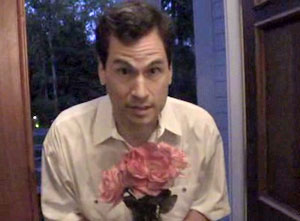In today’s Washington Post, Howard Kurtz reports the alarming news that three “journalists” — Steve Weinberg, Russell Carollo, and Christopher Szecheny — were paid money by the Church of Scientology to examine the St. Petersburg Times‘s “conduct.” This ad hoc “investigation” was commissioned because the newspaper has devoted considerable resources to examining the ostensible religious organization. But the new study is highly suspect. Weinberg reveals in the article that the final results may be withheld from public dissemination, should the Church not find the report to its liking. And in Weinberg’s case, this condition is especially duplicitous — given that his last book was a volume on the brave journalist Ida Tarbell.
 Let’s clarify why this is a dark day for American journalism. A journalist is someone who typically goes out of his way to remain as impartial as he can. If he investigates a story, he is very careful not to accept remuneration from any of the parties involved. He remains ideally a third party. He must, if he is to remain ethical, investigate all sides of the story and remain as transparent as possible.
Let’s clarify why this is a dark day for American journalism. A journalist is someone who typically goes out of his way to remain as impartial as he can. If he investigates a story, he is very careful not to accept remuneration from any of the parties involved. He remains ideally a third party. He must, if he is to remain ethical, investigate all sides of the story and remain as transparent as possible.
Numerous newspapers have established codes of ethics, which can be readily perused online.
The New York Times maintains a very solid ethics policy on neutrality, stating:
Staff members and those on assignment for us may not accept anything that could be construed as a payment for favorable coverage or for avoiding unfavorable coverage. They may not accept gifts, tickets, discounts, reimbursements or other benefits from individuals or organizations covered (or likely to be covered) by their newsroom. Gifts should be returned with a polite explanation; perishable gifts may instead be given to charity, also with a note to the donor. In either case the objective of the note is, in all politeness, to discourage future gifts.
Similarly, the Los Angeles Times also maintains rigid standards about conflicts of interest:
Staff members may not enter into business or financial relationships with their sources. Similarly, staff members may not cover individuals or institutions with which they have a financial relationship.
The Associated Press Managing Editors also maintain a Statement of Ethical Principles, noting:
Financial investments by staff members or other outside business interests that could create the impression of a conflict of interest should be avoided.
Thus, by nearly every professional standard, Weinberg, Carollo, and Szecheny have failed. Even if they consider what they do to be “objective,” they have accepted payment from one of the key parties. They have entered into a business relationship with one of their sources. They have willfully thrown away their integrity for these numerous conflicts of interest, taking the Church of Scientology’s money to give it the report that it wants. And the lack of transparency on the Church’s part leads any reasonable outsider to conclude that the motives here are far from noble.
Carollo and Szechenyi explained to Kurtz, “Every entity has the right to receive fair treatment in the press.” And while fairness is certainly a laudable standard, this statement rings hollow when one considers the conditional nature of this pursuit. When Weinberg confesses, “I can certainly use the money these days,” he demonstrates unequivocally what his real motives are. And the whole exercise becomes a willful distortion of journalism, where news stories are sold to the highest bidder. The truly sad thing here is that Weinberg sold out his principles for a pittance — a mere $5,000.
Because of these disgraceful indiscretions, these three men have capitulated their right to be identified as journalists. They no longer have the right to be taken seriously by any major news organization. And if their bylines are to be found within newspapers again, then readers must reject these names as bona-fide upholders of the Fourth Estate.


 There was once a time — before the Internet, or perhaps not at all — in which film critics conducted themselves with something approximating journalistic standards. It was never very much. These were, after all, film critics — often underpaid, most having lost the capacity to marvel at the frequent cinematic magic playing before their eyes and most lacking the dignity to recuse themselves from professional duties before they soured. But the nagging need to catch up with some perceived discrepancy between the fruitless remuneration from their cold analysis and the wanton luxury enjoyed by film stars, to matter in some arrogant and misguided manner, soon caught up with these desperate crayfish. If you have ever had the misfortune to attend a press screening populated with these types, you will encounter, for the most part, wan and humorless individuals with an insufferable sense of entitlement who announce, in all seriousness and with all the subtlety of a Wlliam Shatner line delivery, the big star that they’ll be talking to for ten minutes tomorrow (is that what they truly live for?) and who check their email in the dark instead of paying attention to the flick, the thing before them that they are, after all, paid to take in.
There was once a time — before the Internet, or perhaps not at all — in which film critics conducted themselves with something approximating journalistic standards. It was never very much. These were, after all, film critics — often underpaid, most having lost the capacity to marvel at the frequent cinematic magic playing before their eyes and most lacking the dignity to recuse themselves from professional duties before they soured. But the nagging need to catch up with some perceived discrepancy between the fruitless remuneration from their cold analysis and the wanton luxury enjoyed by film stars, to matter in some arrogant and misguided manner, soon caught up with these desperate crayfish. If you have ever had the misfortune to attend a press screening populated with these types, you will encounter, for the most part, wan and humorless individuals with an insufferable sense of entitlement who announce, in all seriousness and with all the subtlety of a Wlliam Shatner line delivery, the big star that they’ll be talking to for ten minutes tomorrow (is that what they truly live for?) and who check their email in the dark instead of paying attention to the flick, the thing before them that they are, after all, paid to take in.
 Actually, the NYTPicker does have some idea about what it’s talking about.
Actually, the NYTPicker does have some idea about what it’s talking about.